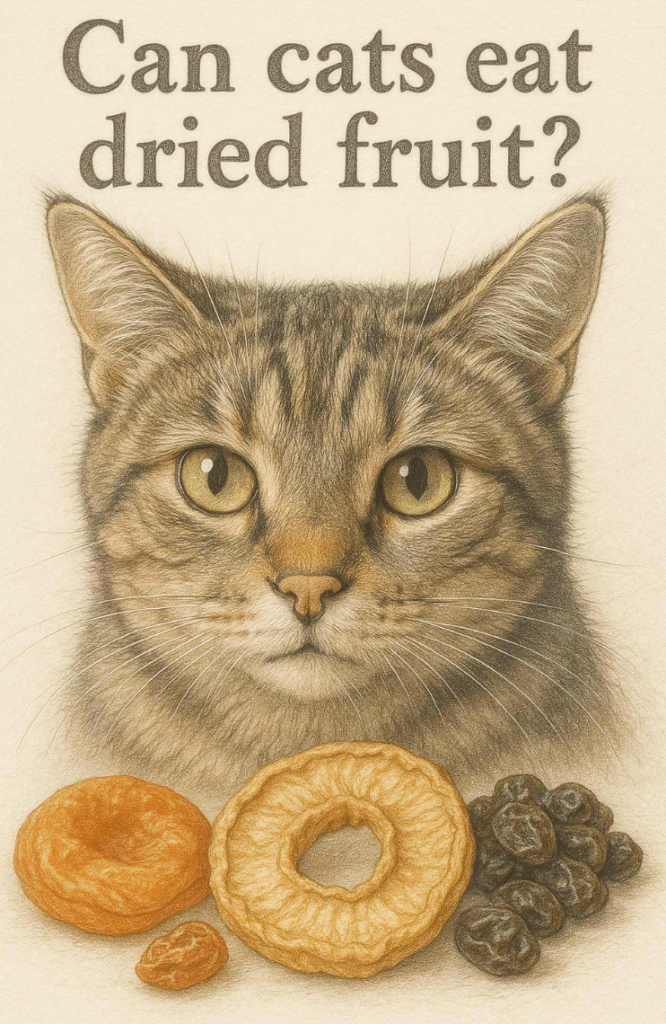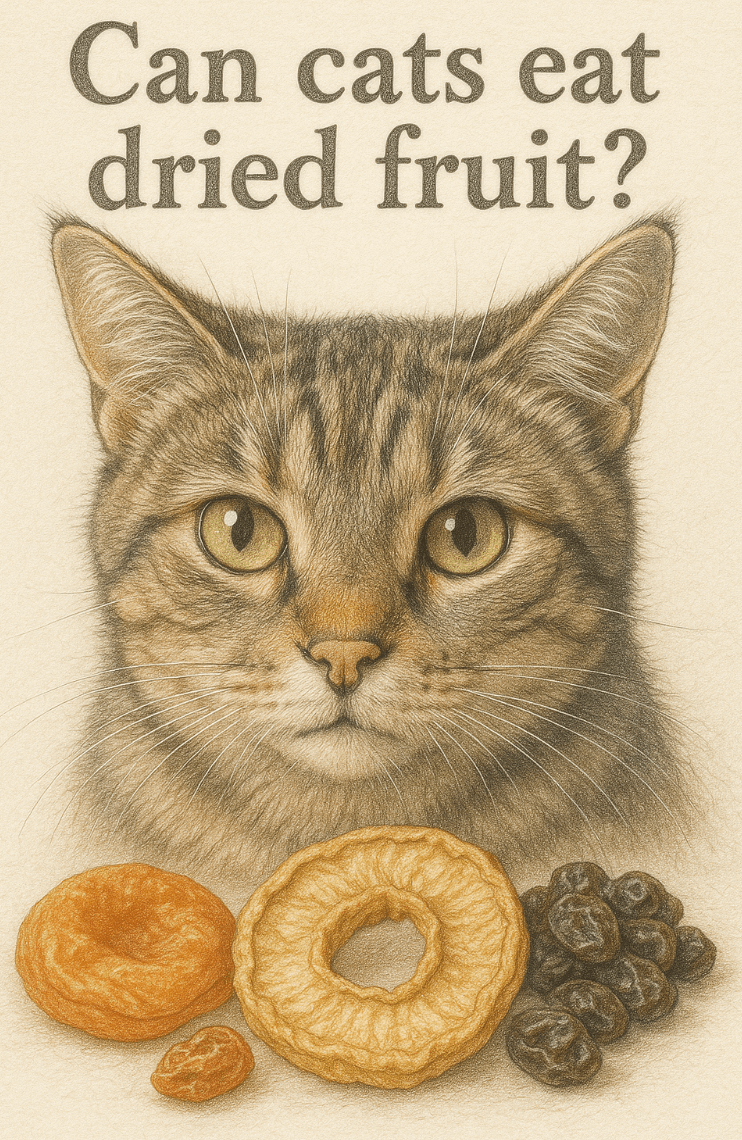Can Cats Eat Dried Fruit?
When it comes to feeding our feline friends, curiosity often leads us to wonder about the safety of human foods. One common question is whether cats can eat dried fruit. While dried fruits like raisins, apricots, and cranberries are popular snacks for humans, they may not always be safe or suitable for cats. Understanding which dried fruits are toxic, which might be harmless in moderation, and how to introduce them (if at all) is essential for keeping your cat healthy. In this blog post, we’ll explore everything you need to know about feeding dried fruit to cats, including potential risks, safer alternatives, and expert advice to ensure your pet’s well-being.
Potential Risks of Feeding Dried Fruit to Cats
While dried fruit might seem like a healthy treat, many types pose serious risks to cats. Their delicate digestive systems and unique nutritional needs make certain dried fruits unsafe or even toxic.
Toxic Ingredients:
Some dried fruits, like raisins and currants, are toxic to cats and can cause kidney failure even in small amounts.High Sugar Content:
Dried fruits are concentrated sources of sugar, which can lead to obesity, diabetes, and dental issues in cats.Choking Hazards:
Small, hard pieces of dried fruit can pose a choking risk, especially if your cat doesn’t chew them properly.Digestive Upset:
The high fiber content in dried fruit can upset your cat’s stomach, leading to diarrhea, vomiting, or constipation.Additives and Preservatives:
Many dried fruits contain added sugars, sulfites, or artificial flavors that are harmful to cats.
These risks highlight why caution is crucial when considering dried fruit as a snack for your cat. Always prioritize their safety over curiosity or convenience.
Safe Alternatives to Dried Fruit for Cats
If you’re looking to treat your cat without the risks associated with dried fruit, there are plenty of safe and nutritious alternatives. These options cater to your cat’s carnivorous nature while providing variety and enrichment.
Cooked Chicken or Turkey:
Plain, unseasoned cooked poultry is a protein-rich treat that cats love and digest easily.Cat Grass:
Cat grass (wheatgrass or oatgrass) offers fiber and nutrients while satisfying your cat’s natural grazing instincts.Freeze-Dried Meat Treats:
Freeze-dried meat snacks are a convenient and healthy way to reward your cat with protein-packed treats.Small Pieces of Fish:
Cooked, boneless fish like salmon or tuna (in moderation) provides omega-3 fatty acids that support skin and coat health.Commercial Cat Treats:
Specially formulated cat treats are designed to be safe, nutritious, and appealing to feline taste buds.
These alternatives ensure your cat enjoys tasty snacks without compromising their health.
Check this guide 👉Can Cats Eat Philodendron? Best 7 Expert Tips!
Check this guide 👉Can Cats Eat Aloe Vera Gel? Best 7 Expert Tips!
Check this guide 👉Can Cats Eat Valerian Root? Best 7 Expert Tips!

Safe Foods for Cats | Foods to Avoid Giving Cats |
|---|---|
Cooked chicken or turkey | Raisins and grapes |
Cat grass | Dried fruits with added sugar |
Freeze-dried meat | Fruits preserved with sulfites |
Plain fish (in moderation) | High-sugar snacks like dried mango |
Commercial cat treats | Any food containing artificial additives |
Signs Your Cat May Be Sick After Eating Dried Fruit
If your cat accidentally consumes dried fruit, it’s important to watch for signs of illness. Early detection can help prevent complications and ensure prompt veterinary care.
Vomiting or Diarrhea:
Gastrointestinal upset is one of the first signs that your cat has eaten something harmful.Lethargy or Weakness:
A sudden lack of energy or reluctance to move could indicate poisoning or other health issues.Increased Thirst or Urination:
Excessive drinking or urinating may signal kidney problems caused by toxic ingredients like raisins.Loss of Appetite:
Refusing food is a red flag that something is wrong and requires immediate attention.Difficulty Breathing:
Labored breathing could indicate an allergic reaction or respiratory distress from choking hazards.
Recognizing these symptoms early allows you to act quickly and protect your cat’s health.
How to Safely Introduce New Foods to Your Cat
If you’re curious about offering your cat new foods, it’s essential to proceed with caution. Here are some tips to ensure a safe and positive experience.
Consult Your Veterinarian First:
Always check with your vet before introducing unfamiliar foods to avoid potential harm.Start with Small Portions:
Offer tiny amounts of any new food to monitor your cat’s reaction and prevent overconsumption.Avoid Seasonings and Additives:
Plain, unseasoned foods are safest, as spices, salt, and sugar can irritate your cat’s system.Observe for Allergic Reactions:
Watch for signs like itching, swelling, or gastrointestinal upset after introducing new foods.Stick to Feline-Friendly Options:
Focus on foods specifically recommended for cats rather than assuming human snacks are safe.
By following these guidelines, you can safely explore new tastes while keeping your cat’s well-being a priority.
Common Misconceptions About Feeding Cats Human Food
Many pet owners mistakenly believe that sharing human snacks with their cats is harmless. However, several misconceptions can lead to unintended consequences.
“A Little Won’t Hurt Them”:
Even small amounts of toxic foods like raisins can have severe effects on a cat’s health.“Cats Can Digest Anything”:
Unlike dogs, cats have sensitive digestive systems and struggle with many human foods.“Dried Fruit Is Healthy Like Fresh Fruit”:
The dehydration process concentrates sugar and removes water, making dried fruit less healthy than fresh alternatives.“Cats Need Variety Like Humans”:
Cats thrive on consistency and don’t require dietary variety; their primary need is high-quality protein.“Natural Means Safe”:
Just because a food is natural doesn’t mean it’s safe for cats—many “natural” foods are still toxic.
Dispelling these myths ensures better decision-making when it comes to your cat’s diet.
Healthier Ways to Treat Your Cat Without Dried Fruit
Rewarding your cat doesn’t have to involve risky foods like dried fruit. Here are some healthier ways to show your affection through treats.
Interactive Playtime:
Engage your cat with toys or laser pointers to stimulate their mind and body instead of relying on edible treats.Homemade Cat Treats:
Make simple, feline-friendly treats using ingredients like cooked chicken or pumpkin puree.Puzzle Feeders:
Use puzzle feeders to dispense kibble or treats, providing mental stimulation alongside nourishment.Herbal Cat Nibbles:
Offer cat-safe herbs like catnip or valerian root for a fun and non-toxic indulgence.Hydration-Focused Rewards:
Encourage water intake with wet food or flavored water drops designed specifically for cats.
These alternatives promote a balanced lifestyle while keeping your cat entertained and satisfied.
Understanding Your Cat’s Nutritional Needs
Cats have unique dietary requirements that differ significantly from humans and other pets. Knowing what they need helps you avoid harmful foods like dried fruit.
Obligate Carnivores:
Cats require a diet rich in animal-based proteins and fats, not plant-based carbohydrates.Limited Carbohydrate Tolerance:
Unlike humans, cats cannot efficiently process carbs, making sugary snacks like dried fruit unsuitable.Essential Amino Acids:
Taurine, found in meat, is vital for heart and eye health but absent in most plant-based foods.Low Thirst Drive:
Cats often don’t drink enough water, so wet food is preferable to dry snacks like dried fruit.No Sweet Tooth:
Cats lack the ability to taste sweetness, meaning sugary snacks hold no nutritional or sensory benefit for them.
Understanding these needs ensures you provide the best possible care for your feline companion.
Frequently Asked Questions About Cats and Dried Fruit
Are raisins toxic to cats?
Yes, raisins are highly toxic to cats and can cause kidney failure even in small amounts.
Can cats eat dried cranberries?
While not as toxic as raisins, dried cranberries often contain added sugars or preservatives that are unhealthy for cats.
What should I do if my cat eats dried fruit?
Contact your veterinarian immediately, especially if the fruit contains raisins, currants, or harmful additives.
Is plain dried fruit ever safe for cats?
Rarely. Even non-toxic dried fruits are high in sugar and fiber, making them unsuitable for regular consumption.
Why do cats dislike sweet foods?
Cats lack the taste receptors for sweetness, so sugary snacks like dried fruit hold little appeal and offer no nutritional value.
Prioritizing Your Cat’s Health When It Comes to Food Choices
Feeding dried fruit to your cat comes with significant risks, and in most cases, it’s best avoided altogether. While cats are naturally curious about what we eat, their dietary needs are vastly different from ours. By understanding which foods are safe and which are dangerous, you can ensure your feline friend stays happy, healthy, and free from harm. Always consult your veterinarian before introducing new foods, and remember that cats thrive on a balanced diet tailored to their carnivorous nature. With the right knowledge and care, you can provide your cat with treats that are both enjoyable and beneficial.
Do Cats Have Taste Buds? Best 7 Expert Tips! – Discover how cats experience flavors and why their taste is so unique.
Do Dogs Have Taste Buds? Best 7 Expert Tips! – Discover how dogs experience taste, their preferences, and what it means for their diet and health.
Can Cats Taste Sweet? Best 7 Expert Tips! – Discover why cats can’t taste sweetness, how it affects their diet, and tips to keep them healthy and happy.
Can Dogs Taste Sweet? Best 7 Expert Tips! – Discover how dogs perceive sweetness, which foods are safe, and tips to manage their sweet cravings responsibly.





